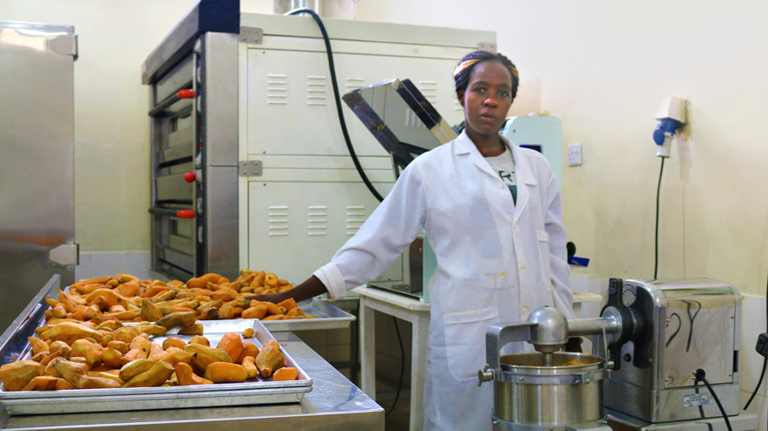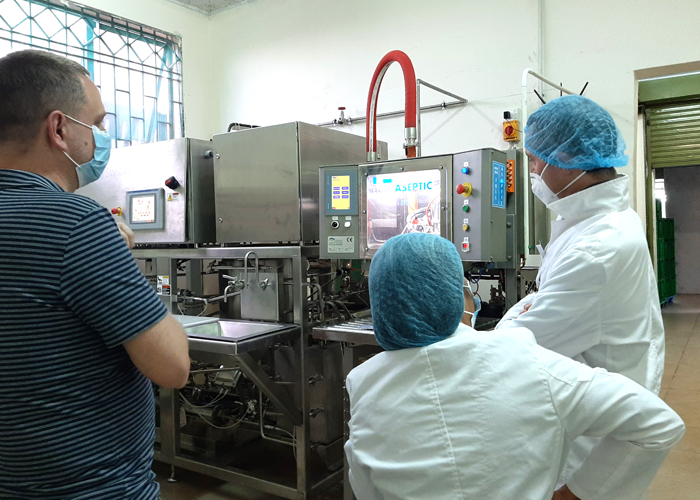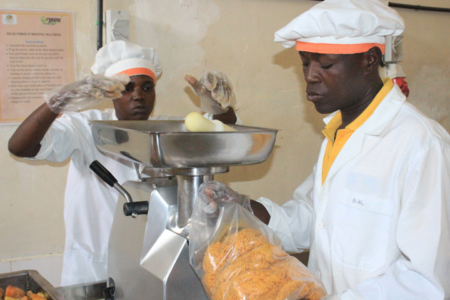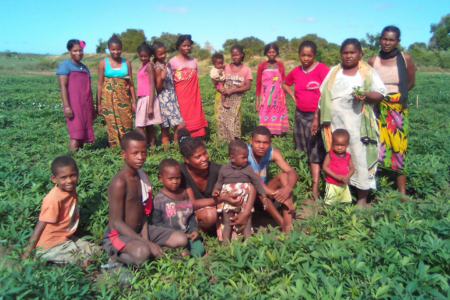
Orange-fleshed sweetpotato (OFSP) puree can be used as a substitute for 30-60% of the flour in a range of baked or fried products, reducing production costs and increasing their nutritional content. International Potato Center (CIP) scientists developed a vacuum-packed storage technology that allows OFSP puree to be stored without refrigeration for months, creating the potential for widespread use by bakeries and food vendors. This project aims to take the OFSP puree for bakery application to scale in Kenya, Malawi and Uganda.
Background
Sweetpotato is a highly productive food crop that can be grown on marginal land with few inputs, giving it potential to play a greater role in Kenyan food systems. Early maturing varieties are ready to harvest 3-4 months after planting, when most other crops are still growing. Together with drought and heat tolerance, early maturation makes sweetpotatoes resilient to the effects of climate change, contributing to food security and income generation, especially in arid and semi-arid lands and when other crops fail.
Orange-fleshed sweetpotato is rich in β-carotene, which is converted to vitamin A in the human body, and just 125 grams provide the daily vitamin A needs of a child aged five or younger. It can thus be a sustainable source of that essential nutrient for children and women in remote areas.
To combat malnutrition and catalyze income opportunities, the International Potato Center (CIP) has promoted the use of orange-fleshed sweetpotato, in the form of aseptic purée, as an ingredient in food products made by small and medium-sized enterprises and the informal market sector. The production of aseptic purée begins with peeling, steaming, and pulping the sweetpotatoes, followed by a sterilization process.
The commercial use of orange sweetpotato purée can generate increased demand for nutritious varieties, improving their market value and increasing farmer incomes and adoption. Sweetpotato purée is convenient and ready to use, which can motivate more households at risk of vitamin A deficiency to consume this nutritious food. It also provides opportunities for consumers who might not eat orange fresh sweetpotatoes to benefit from the vitamin A they provide through convenient foods such as baby food, porridge, incorporation in school meals, and bakery products such as bread, buns or doughnuts.
To address the challenge of perishability, food scientists at CIP, working closing with private sector experts, are introducing a technology in Kenya for producing shelfstable purée using microwave processing and aseptic packaging. This allows purée to be stored for a year at ambient temperatures, eliminating the need for cold storage. CIP has worked with food processing experts and private sector partners to take this technology to scale and enable millions of households and enterprises to use purée year round to make nutritious porridge, bread, soups, casseroles, and other dishes.
Objectives
The overall goal is to promote greater utilization and catalyze growing demand for nutritious sweetpotato products through investments in supply chains and processing to take advantage of emerging markets for nutritious foods. To achieve this, the project seeks to:
- Introduce production of aseptic, shelf-stable orange sweetpotato purée in Kenya using a continuous-flow microwave system.
- Promote consumption of orange sweetpotato puréebased products in urban areas by increasing the production and availability of shelf-stable purée as an ingredient in products such as baby food, baked and fried products, amongst others.
- Reduce postharvest losses by minimizing the quality gap between fresh and processed orange sweetpotato products. Aseptic purée is shelf stable for more than one year without refrigeration.

Approach
Continuous-flow microwave heating, an emerging technology in food processing, offers a fast and efficient way to sterilize sweetpotato purée while retaining color, flavor, and nutritional quality better than conventional sterilization systems. Tests show that shelf-stable products sterilized by this system are equivalent to pasteurized, refrigerated products in terms of freshness perception, likability, and purchase intent.
Under the Development and Delivery of Bio-fortified crops at Scale project, funded by the Foreign Commonwealth & Development Office (FCDO) of the United Kingdom, CIP has partnered with North Carolina State University (NCSU), the US company SinnovaTek, LLC and the Kenyan company Burton and Bamber Co. Ltd (B&B) to establish the first continuous-flow microwave system for sweetpotato purée production in Kenya. An agro-processing company specializing in preservation of fruit and other crops, B&B works directly with farmers through an out-growers scheme to ensure a supply of fresh roots for processing.
CIP is supporting B&B’s acquisition of purée processing and aseptic packaging equipment from SinnovaTek, while providing technical training in sweetpotato purée production.
Positive social and environmental impacts are part of the company’s business strategy and will be measured as part of the success of the investment.
Key deliverables
In collaboration with researchers from NCSU and SinnovaTek, CIP provided B&B with support to establish the first continuous-flow microwave system for sweetpotato purée production in Kenya. SinnovaTek shipped a microwave processor to Kenya to be operated by B&B.
B&B works with small-scale farmers in Makueni and Kitui counties, in central eastern Kenya, to secure a supply of fresh sweetpotatoes. B&B also identified and trained decentralized vine multipliers (DVMs) to ensure a supply of disease-free planting material, or vine cuttings, for growers in each location.
Under the out-grower scheme, B&B signed contracts with farmers to supply sweetpotatoes and provided them with training in agronomy, integrated pest management, and crop protection management to ensure production of sufficient quality. Once good agricultural practices were implemented at farm level, B&B helped those farmers obtain Global Gap certification, an international standard assuring food safety.
At least twelve African orange-fleshed sweetpotato varieties are being studied to determine which ones are most suitable for use in commercial microwave processing, which includes heating, drying, pasteurization and sterilization.
CIP and B&B will co-develop a marketing strategy to drive utilization of the purée in commercial and informal markets and to ensure that communities at risk of vitamin A deficiency are consuming products that contain it.
Partners
- Burton and Bamber Co Ltd (B&B)
- Agriculture and Food Authority (AFA)
- Kenya Plant Health Inspectorate (KEPHIS)
- Horticultural Crops Development Authority
- RTI International
- SinnovaTek
- North Carolina State University
- Euro Ingredients Limited
- Farmer groups in Makueni, Kitui, Machakos, Muranga and Ithanga
Contact
Simon Heck
CIP, Kenya
s.heck@cgiar.org
Thanks to our donors



